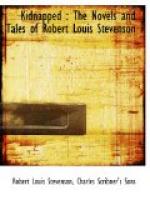At Kinlochaline I got Neil Roy upon one side on the beach, and said I made sure he was one of Appin’s men.
“And what for no?” said he.
“I am seeking somebody,” said I; “and it comes in my mind that you will have news of him. Alan Breck Stewart is his name.” And very foolishly, instead of showing him the button, I sought to pass a shilling in his hand.
At this he drew back. “I am very much affronted,” he said; “and this is not the way that one shentleman should behave to another at all. The man you ask for is in France; but if he was in my sporran,” says he, “and your belly full of shillings, I would not hurt a hair upon his body.”
I saw I had gone the wrong way to work, and without wasting time upon apologies, showed him the button lying in the hollow of my palm.
“Aweel, aweel,” said Neil; “and I think ye might have begun with that end of the stick, whatever! But if ye are the lad with the silver button, all is well, and I have the word to see that ye come safe. But if ye will pardon me to speak plainly,” says he, “there is a name that you should never take into your mouth, and that is the name of Alan Breck; and there is a thing that ye would never do, and that is to offer your dirty money to a Hieland shentleman.”
It was not very easy to apologise; for I could scarce tell him (what was the truth) that I had never dreamed he would set up to be a gentleman until he told me so. Neil on his part had no wish to prolong his dealings with me, only to fulfil his orders and be done with it; and he made haste to give me my route. This was to lie the night in Kinlochaline in the public inn; to cross Morven the next day to Ardgour, and lie the night in the house of one John of the Claymore, who was warned that I might come; the third day, to be set across one loch at Corran and another at Balachulish, and then ask my way to the house of James of the Glens, at Aucharn in Duror of Appin. There was a good deal of ferrying, as you hear; the sea in all this part running deep into the mountains and winding about their roots. It makes the country strong to hold and difficult to travel, but full of prodigious wild and dreadful prospects.
I had some other advice from Neil: to speak with no one by the way, to avoid Whigs, Campbells, and the “red-soldiers;” to leave the road and lie in a bush if I saw any of the latter coming, “for it was never chancy to meet in with them;” and in brief, to conduct myself like a robber or a Jacobite agent, as perhaps Neil thought me.
The inn at Kinlochaline was the most beggarly vile place that ever pigs were styed in, full of smoke, vermin, and silent Highlanders. I was not only discontented with my lodging, but with myself for my mismanagement of Neil, and thought I could hardly be worse off. But very wrongly, as I was soon to see; for I had not been half an hour at the inn (standing in the door most of the time, to ease my eyes from the peat smoke) when a thunderstorm came close by, the springs broke in a little hill on which the inn stood, and one end of the house became a running water. Places of public entertainment were bad enough all over Scotland in those days; yet it was a wonder to myself, when I had to go from the fireside to the bed in which I slept, wading over the shoes.




